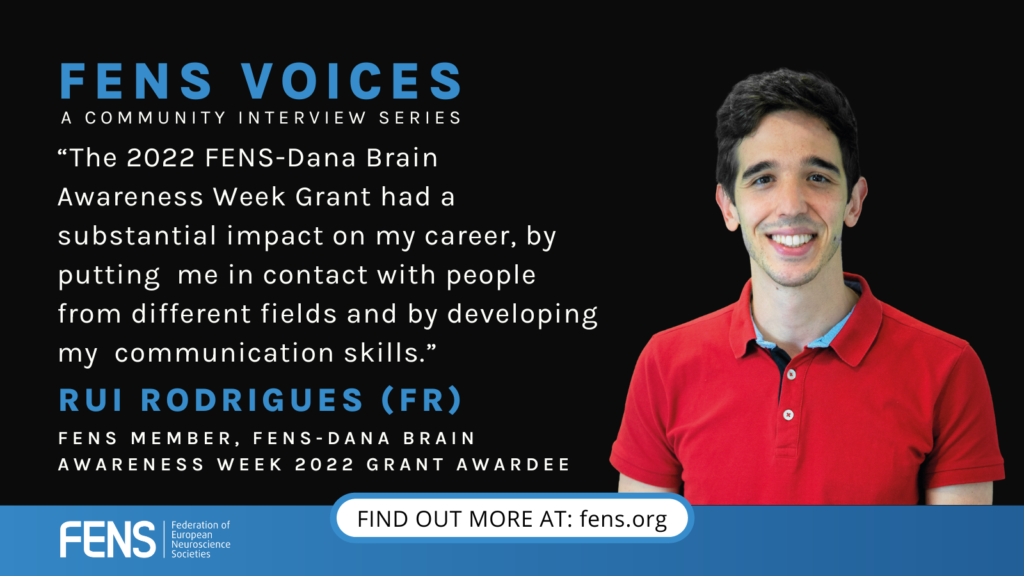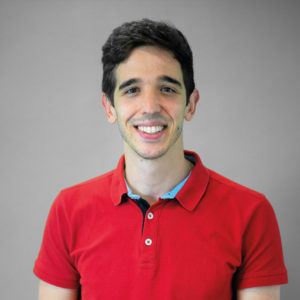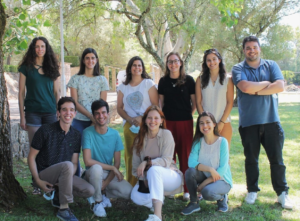
FENS Voices | Rui Rodrigues: Choosing the right calls
14 October 2022
FENS News, Neuroscience News
FENS caught up with one of our members, Dr Rui Rodrigues from Portugal, to find out about his research endeavours after he was awarded a FENS-Dana Brain Awareness Week 2022 grant. Dr Rodrigues is happiest collaborating in multidisciplinary teams, envisioning new projects and answering novel scientific questions as well as making (neuro)science more accessible and inclusive to the public. He started as a researcher in Dr Ana Sebastião’s lab, at Faculdade de Medicina, Universidade de Lisboa, Portugal, and is currently moving to Bordeaux, France, as a postdoctoral fellow in Giovanni Marsicano’s lab at Neurocentre Magendie. Read the full interview below.

What initially attracted you to science/neuroscience?
RR: I’ve always been fascinated by how the world operated around me, especially how we’re so different from one another. My natural curiosity prompted me to pursue a science degree and only later, during my undergraduate training, I pursued my passion for neuroscience. The brain is still a mystery. I am motivated to try solving some of those mysteries.
You obtained a Master of Science in Cellular and Molecular Biology, with a focus on Neurobiology. How were your student years?
RR: Quite memorable! I first studied at the University of Coimbra, Portugal’s oldest university, and then moved to Lisbon to do my Master thesis. At that time, it just looked like the right move: working in a different environment, full of bright and inquisitive minds, that nurtured my creative and critical thinking abilities. These studying years gave me the foundation to become the neuroscientist I am today, because they shaped my way of thinking, looking at science and doing brain research. My experiences fostered my professional and personal development.
What advice would you give to your younger self?
RR: In full honesty: “Keep up your hard work, but… plan things in advance!”
Your early work gravitated around the role of cannabinoids in controlling neurogenesis and studied the influence of the adenosinergic system in this process. How would you describe your first project?
RR: My first project aimed at assessing the influence of cannabinoid and adenosinergic systems in regulating the neurogenic process using in vitro approaches. We discovered that cannabinoid type 1 and type 2 receptors interact to fine-tune neurogenesis and that adenosine A2A receptors are important players in mediating this process. I can’t reveal much, as some data is still unpublished. I can surely state that we are having exciting results!
For my PhD, I wanted to tackle a more translational aspect of neurobiology and, as I’ve always been intrigued by psychiatric disorders, I decided to dissect the actions of cannabinoids and physical exercise in the context of depression. We’ve known for some time now that physical exercise has a lot of benefits for depressed individuals, but the mechanisms that drive these effects remain poorly understood. Given evidence suggesting that cannabinoids mediate some effects of physical exercise, it seemed logical to address their role in a depression-related setting. We have obtained interesting data that will be submitted soon for publication, so stay tuned!
During the past years, I’ve been drawn to figuring out what are the processes that govern brain function and what happens when such mechanisms fail. Doing a PhD in Neuroscience was the obvious path to do this: studying a specific subject with the support of a team and institution while specialising in a certain field. As I want to become an academic expert in the field of neuropsychopharmacology, pursuing this doctoral degree was the right thing to achieve such a goal.

What were the greatest challenges of being a PhD student and how did you manage to overcome them?
RR: Every PhD student has its own challenges, and I was no exception. Although my journey was fairly smooth, I had to cope with some experiments that didn’t work, with some papers that were rejected, followed by periods of frustration. I even had a COVID-19 outbreak happening halfway through my PhD. Adapting to that new reality was really tough… But I “kept my cool” during those difficult times by 1) being optimistic and managing my expectations, 2) prioritising my mental and physical well-being, and 3) always having in mind why I enjoy doing science so much. The support received from my mentors and colleagues proved crucial in enduring hard times, especially the guidance from my PhD supervisor, which was extremely valuable and for which I am very grateful. I even got to write an opinion article for the official journal of FENS, the European Journal of Neuroscience, with tips for other students on how to seize balance and success during their PhD experience.
How important is it for an early career researcher to be featured in scientific publications, such as the European Journal of Neuroscience?
RR: Extremely important! I guess publishing is one of the most important parts [if not the most important] of being a scientist. It’s where you are able to show your research and opinion in a specific field or topic. For early career researchers, it’s an opportunity to grow and learn about the peer-review and publishing processes, how to present your research/opinion and take constructive criticism, and how to handle reviewers and editors. For example, in the case of my opinion article at EJN, although I had previous experience in publishing, it was the first time I was “in command” as the corresponding author (being responsible for finding the right journal, preparing for submission, addressing reviewer comments, handling production phase, etc), which was quite challenging but also very rewarding.
How would you describe the brain in one word?
RR: Absolutely fascinating! (sorry, that’s two words)
Who are your biggest inspirations in science and why?
RR: I could talk for hours about this, but I’ll highlight a quintet: two Portuguese, two international scientists and my mentor, a direct and personal inspiration. Two really distinctive Portuguese neurologists and neuroscientists, Egas Moniz and António Damásio, had revolutionary perspectives and solutions to tackle some neurobiological puzzles. The two international scientists would be Santiago Rámon e Cajal and Robert Sapolsky, for instigating my curiosity with their visionary mindset and for their drawings and writing style, respectively. Finally, one woman to round up this quintet: my PhD supervisor, Sara Xapelli, for being such a great and inspirational mentor.
You were a FENS Brain Awareness Week awardee. How has it impacted your career? How important are these types of grants for early career researchers?
RR: First, it gave a lot of visibility to “Fala-me Neuro”, our all-Portuguese neuroscience communication project. It also provided the means to execute the different activities we had planned for the BAW to make science more accessible and inclusive for a larger audience. Our main goal was to break down complex neuroscience-related topics to young people and we were able to reach around 500 students (from various ages) in just one week, which was really remarkable. Secondly, it had a substantial impact on my career, by putting me in contact with people from different fields – networking with other awardees and communication offices – and allowing me to further develop my management and communication skills, which are essential tools if you aim to become a great (neuro)scientist.
You received a lot of funding for your research. What are the most important elements that early career researchers should focus on when submitting their applications? What is your secret?
RR: Most of the funding I received so far was related to travel awards and communication prizes. I believe that training should be a central aspect of the life of an early career scientist and, as such, I always looked forward to going to summer schools, workshops, and conferences – to expand my conceptual and technical knowledge, share my work with colleagues and get feedback in informal settings from fellow experts. When preparing an application, one should focus on what really drives them or their research and how well their proposal fits with the application requirements. I’m not sure I have a particular secret, but I would say that choosing the right calls and being honest about your goals and expectations are two of my best pieces of advice.
What will your next research project be about?
RR: I recently finished my PhD and I’ll be soon joining Giovanni Marsicano’s lab as a postdoctoral fellow at Neurocentre Magendie in Bordeaux, France. I will explore the neurobiological underpinnings of adaptive behaviours, focusing on the role of the endocannabinoid system in mediating coping behaviours.
About Rui Rodrigues
Rui Rodrigues is a molecular and behavioural neuroscientist passionate about neuroscience and science communication. His educational background includes a BSc degree in Biology followed by a MSc degree in Cellular and Molecular Biology with a specialisation in Neurobiology. He has recently finished his PhD in Neurosciences at Instituto de Medicina Molecular João Lobo Antunes, Faculdade de Medicina, Universidade de Lisboa, during which he discovered mechanisms underlying the actions of cannabinoids and physical exercise in fine-tuning postnatal and adult neurogenesis. Dr Rodrigues is the founder and manager of “Fala-me Neuro”, a communication initiative that fosters neuroscience literacy and interest to the Portuguese public. He has received public and private funding (FCT, FENS, EMBO, ISN) to support his doctoral studies and communication activities, and is the recipient of several prizes and awards, including FENS/Dana Foundation Brain Awareness Week 2022 grant. He is currently moving to Bordeaux as a postdoctoral fellow in Giovanni Marsicano’s lab at Neurocentre Magendie.
About the Federation of European Neuroscience Societies (FENS)
Founded in 1998, the Federation of European Neuroscience Societies is the main organisation for neuroscience in Europe. It currently represents 44 national and single-discipline neuroscience societies across 33 European countries and more than 22,000 member scientists. Discover FENS and subscribe to our biweekly News Alert, with information on our latest calls and activities.